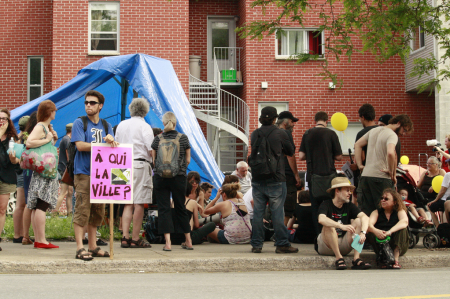MONTREAL—Some 100 protesters established an occupation of an empty lot in Montreal's working-class neighbourhood of St-Henri on Saturday, calling on the city to dedicate more land to social housing and to reduce the rapid rate at which condominiums are being built in the city.
"Since 2000, Montreal has been in what we call a housing crisis," said Fred Burrill, an organizer with the POPIR Tenants Committee, which serves the southwest regions of the city, including St-Henri, Little Burgundy, Côte-St-Paul and Ville-Émard. "This means the vacancy rate of available apartments for tenants looking for apartments is under three per cent. And the city has essentially made a decision that the development of popular neighbourhoods will be given lock stock and barrel to private developers...And we're saying we're here today, we're taking back this empty lot, but in general we're taking back the city as a whole." Related actions are being held in Point-St-Charles today, and in Villeray next week, Burrill said.
"All over the city popular neighbourhoods are coming together to say this process of the profit margin driving how we conceive our neighbourhoods and who gets to live in them can't continue any longer," he added.
"À qui la ville? A nous la ville!" was the call and response as the march left Lionel Groulx metro on Saturday afternoon and wound its way through the neighbourhood until it reached an empty lot at the corner of Notre-Dame and St-Philippe, just a couple blocks from St-Henri metro. The march was declared illegal by police under bylaw P-6 just as it took the street at Delisle and Atwater, since organizers did not provide an itinerary beforehand. Protesters were able to continue without police interference to the site, although the police presence was large for the number of people present.
At the site, a blue tarp supported by two high, wooden posts already stood on the land, and others moved quickly to start setting up tents.
The goal, which until then had been unannounced: an occupation of a vacant lot in St-Henri, belonging to controversial and well-known landlord and land-owner Peter Sergakis.
"This site is close to [the corner of] Ste-Marguerite and Notre-Dame, which is kind of the heart of the western part of St-Henri," said Patricia Viannay, another organiser with POPIR. "Not long ago, we did a survey of vacant lots in the area and we found four. Since then, two have been developed into condos. So there was a real urgency that the lots that remained become something other than condos. That's why we chose this one, and it also turns out that we took a plot that belongs to [Peter] Sergakis, who is a slumlord in the area. So it also allows us to denounce the fact that he makes a lot of money off the backs of tenants."
The main demand of the occupation is that the city create a land reserve, either on that plot or others in the neighbourhood, dedicated to social housing. A land reserve is where the city either buys a lot or restricts zoning in order to remove it from the commercial market and to use it for another purpose. In this case, the demand is that city transfer or sell it to a community organization or non-profit who would then oversee the development of social housing.
"What we're saying is, in order to put a stop to that speculative process, we want the city to take responsibility for the people who live here and the people who have elected them, and put into place this land reserve to buy empty lots and empty buildings, take them off the speculative market, and then sell them to community groups, and social housing projects," explained Burrill.
St-Henri is still a primarily a tenant neighbourhood, with over 80 per cent of residents renting - a higher proportion than in other parts of the city. At the same time, said Viannay and Burrill, property speculation has caused property taxes and therefore rent sto rise, but salaries have not risen in kind. The result, according to Viannay, is a growing proportion of residents putting 50 per cent of their pay towards rent, leading to less money for food, education and other activities.
Protesters crowded the street and the site at first, but police pushed people onto the sidewalk, warning that those remaining in the road would be ticketed. There was ample space in the lot for the protesters, which by then also featured half a dozen tents, an information table and signs announcing the reason for the occupation. A general assembly was also quickly called so that people who wished to participate in the occupation could discuss how they would like it to happen.
Between discussions, music was played over the loudspeaker, trays of sandwiches and boxes of apples and granola bars arrived, and free water was provided to help deal with the 35 degree heat.
While the initial logistics were planned by POPIR and other organizing groups, both Viannay and Burril stressed that what happened next was up to the people assembled. "It's a democratic occupation, so it will be for the people who are hear to decide how they want to react if and when there is an expulsion order," said Burrill.
Because the land is privately held, it would take a complaint from the owner, Peter Sergakis, to demand their expulsion. Known for being an avid supporter of private development in the city, his reaction came as a bit of a surprise: "They have a message for the government, that they want more social housing,” Sergakis told the Montreal Gazette's Janet Bagnall. “Let them deliver the message. It’s a democracy. It’s their job to defend the poor. As long as they don’t hurt anyone or do any damage, I don’t mind. They can stay there.” At the same time, he also said that he sees no responsibility for private developers in ensuring more social housing is built. "I’m a developer. Why should developers be subsidizing poor people? That’s the government’s job," he told Bagnall.
The protesters seem to be ready to make good on their plans to remain until they receive an adequate answer from the city. Donations were already coming in from residents of the neighbourhood yesterday, and a small generator was also on site.
Support has also been flowing over social media. With Saturday night's torrential downpour and Sunday morning's continuing rain, requests for dry clothes and equipment went out over Facebook and text message and were quickly spread far and wide.
Participating in public consultations and meeting with municipal officials may seem to some like a more worthwhile—and less arduous—way to achieve À qui la ville's goals, but for Burrill and Viannay, those options have been exhausted.
"Over the last five to ten years, the POPIR has participated in the game, in the consultation process," said Burrill. He gave the example of the formerly popular and working class neighbourhood of Griffintown. According to Burrill, developers decided that this would be an ideal location for condo developments, "to make a whole neighbourhood of condos." POPIR participated in several public consultations, submitted reports on the rate of low-income people needing adequate housing, but the city didn't respond to their requests. Burrill believes that the decision had already been made by the city and developers to go ahead with the project, before the consultations began. This is a common complaint that many housing activists in Montreal have had about the public consultation process over the years.
"So, essentially they've forced us to do this kind of action, to move outside the official structures, because we can see the official structures are closed to low income people and the groups that represent them," said Burrill. Viannay concurred: "We were active in the ... traditional forms of lobbying [but] never able to obtain a land reserve for social housing, so we're reached another stage," she said.
For now, the occupation will last as long as participants want it to, but Viannay and Burrill hope that it continues - and will continue to participate - long enough to achieve their goal. "As POPIR, we support people who want to stay here a long time. We find it totally legitimate that people re-appropriate public spaces, and make the alive, so long as our demands are not met. We hope that people stay a long time, that others will come as reinforcements, but it now belongs to the people on site."
As Burrill put it: "We're here until we get an answer that's not bullshit."




